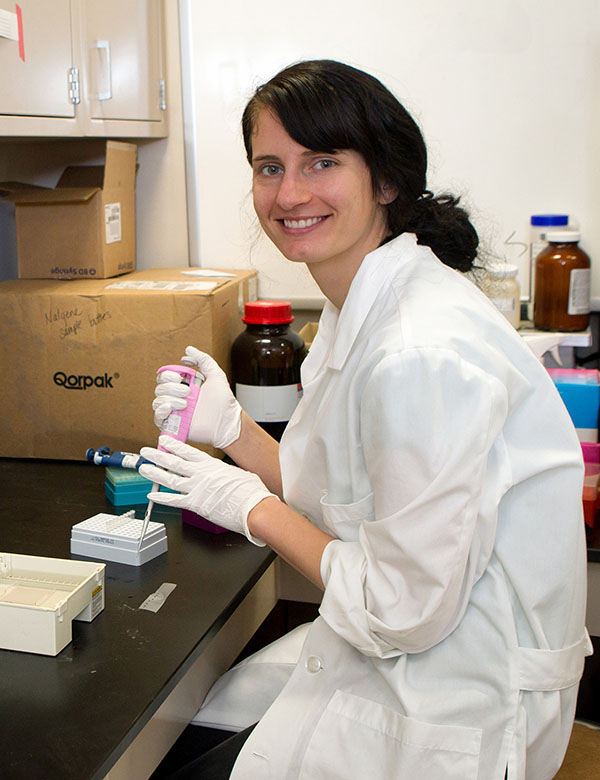BOONE—When Mara C. Cloutier chose to attend graduate school at Appalachian State University, the Asheville resident said it was because she could explore two possible passions: field work and lab research.
Cloutier is a first-year graduate student in Appalachian’s Department of Biology working with Dr. Suzanna Bräuer (biology) and Dr. Sarah Carmichael (geology) on the effects of water pollution on cave ecosystems. She recently received two awards to support her research this summer – a $2,500 grant from the Cave Research Foundation and a $1,500 grant from the Geological Society of America.
“I knew as an undergraduate at UNC Wilmington that I liked laboratory research but I also wanted to see if I would like field research as well,” Cloutier said. “Appalachian offered me the opportunity to do both.” She studied geomicrobiology as an undergraduate at UNC Wilmington, and her interdisciplinary research at Appalachian draws from the fields of biology and geology. She is looking at how and why microbes (bacteria and fungi) make minerals in cave environments, and using these biominerals to track the extent of human impact (pollution and agricultural runoff) on these complex ecosystems.
Cloutier will use the research grants to conduct geochemical analyses of metals that are found in the substrates of caves in Tennessee and Virginia. She also will analyze water samples collected in the caves to identify the sources of carbon infiltrating the caves through water seeping into the subterranean spaces. She also is interested in learning how the carbon is stimulating the growth of metal-oxidizing microbes found in the caves.
The information is important, she said, in part because of a possible correlation between a metal-oxidizing microbes found in caves and carbon input. “In essence that means that when there is a contamination in water originating from outside of the cave, it will stimulate the growth of bacteria and fungi in the cave when it flows through it,” she said. “Many people get their drinking water from the local karst aquifers that interact with these caves without knowing what’s in the water.
“I think the research we are performing in these caves can be used to identify the source of the contaminants responsible for the bacteria and fungi growth and can also be applied to other ecosystems,” Cloutier said. “These microbes are found just about everywhere, from freshwater sources to soil to the deep sea.”
She said receiving research grants, and the possible publications in scientific journals that will follow, are important for students as they build their professional resumes in hopes of entering a highly competitive Ph.D. program, which is her goal after graduating from Appalachian.
About Appalachian State University
As a premier public institution, Appalachian State University prepares students to lead purposeful lives. App State is one of 17 campuses in the University of North Carolina System, with a national reputation for innovative teaching and opening access to a high-quality, cost-effective education. The university enrolls more than 21,000 students, has a low student-to-faculty ratio and offers more than 150 undergraduate and 80 graduate majors at its Boone and Hickory campuses and through App State Online. Learn more at https://www.appstate.edu.
What do you think?
Share your feedback on this story.




![How NCInnovation Is Rethinking Economic Development in North Carolina [faculty featured]](/_images/_posts/2026/02/rethinking-economic-development-600x400.jpg)







